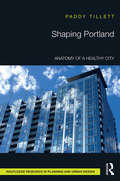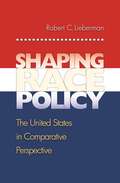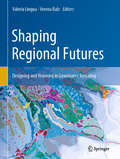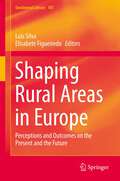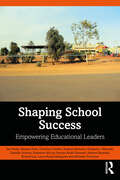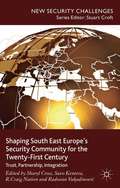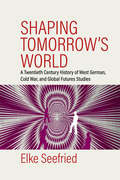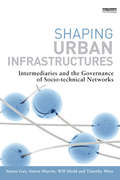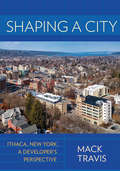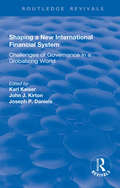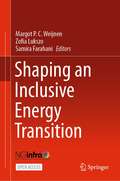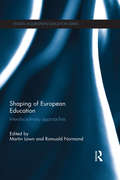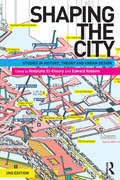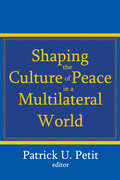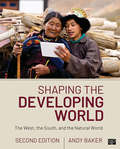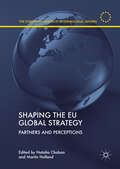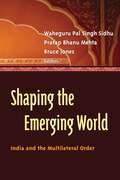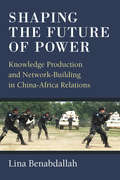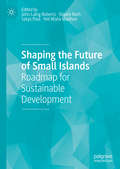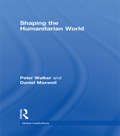- Table View
- List View
Shaping Portland: Anatomy of a Healthy City
by Paddy TillettPortland is a young city founded on a river bank in a virgin forest less than 200 years ago. Shaping Portland: Anatomy of a Healthy City is about the values engendered by the place, and how those values have influenced the growing city. It examines how and why the public realm supports or obstructs the health-forward lifestyles of those who choose to live there. This book explores the values and dynamics that shaped a healthy city to enable those things. It is a case study of a recognized success – looking more closely at a recent urban infill: the Pearl District. The future roles of the planners and other design professionals in continuing to build healthy and responsive environments are suggested. The cities of the future will be those that we already inhabit, but infilled and adapted to tomorrow’s needs and values. Understanding the dynamics involved is essential for those in whose hands we entrust the design of cities and urban places.
Shaping Race Policy: The United States in Comparative Perspective (Princeton Studies in American Politics: Historical, International, and Comparative Perspectives #93)
by Robert LiebermanShaping Race Policy investigates one of the most serious policy challenges facing the United States today: the stubborn persistence of racial inequality in the post-civil rights era. Unlike other books on the topic, it is comparative, examining American developments alongside parallel histories of race policy in Great Britain and France. Focusing on on two key policy areas, welfare and employment, the book asks why America has had such uneven success at incorporating African Americans and other minorities into the full benefits of citizenship. Robert Lieberman explores the historical roots of racial incorporation in these policy areas over the course of the twentieth century and explains both the relative success of antidiscrimination policy and the failure of the American welfare state to address racial inequality. He chronicles the rise and resilience of affirmative action, including commentary on the recent University of Michigan affirmative action cases decided by the Supreme Court. He also shows how nominally color-blind policies can have racially biased effects, and challenges the common wisdom that color-blind policies are morally and politically superior and that race-conscious policies are merely second best. Shaping Race Policy has two innovative features that distinguish it from other works in the area. First, it is comparative, examining American developments alongside parallel histories of race policy in Great Britain and France. Second, its argument merges ideas and institutions, which are usually considered separate and competing factors, into a comprehensive and integrated explanatory approach. The book highlights the importance of two factors--America's distinctive political institutions and the characteristic American tension between race consciousness and color blindness--in accounting for the curious pattern of success and failure in American race policy.
Shaping Regional Futures: Designing and Visioning in Governance Rescaling
by Valeria Lingua Verena BalzThis book discusses the role of regional design and visioning in the formation of regional territorial governance to offer a better understanding of (1) how a recognition of spatial dynamics and the visualization of spatial futures informs, and is informed by, planning frameworks and (2) how such design processes inform co-operation and collaboration on planning in metropolitan regions. It gathers theoretical reflections on these topics, and illustrates them by means of practical experiences in several European countries. Innovatively associating ideas with knowledge, it appeals to anyone with an interest in planning experiments in a post-regulative era. It aims at an increased understanding of how practices, engaged with the imagination of possible futures, support the creation of institutional capacity for strategic spatial planning at regional scales.
Shaping Rights in the ECHR
by Eva Brems Janneke GerardsIn fundamental rights adjudication, a court first has to determine whether the interest at stake falls within the scope of the fundamental right invoked. Whether or not an individual interest falls within the scope or ambit of one of the fundamental rights protected by the European Convention on Human Rights determines whether or not the European Court of Human Rights can decide on the merits of a case. This volume brings together a variety of legal scholars in order to examine the scope of fundamental rights. Topics range from the nature of human rights and the real or imagined risk of rights inflation to theories of positive obligations and social and economic rights. It contains contributions of a theoretical nature as well as analytical overviews of the ECtHR's approach. In addition, comparisons are made with domestic, EU and international law.
Shaping Rural Areas in Europe
by Luís Silva Elisabete FigueiredoShaping Rural Areas in Europe. Perceptions and Outcomes on the Present and the Future sets out to investigate the effect of urban perceptions about the rural and consequent demands on rurality on the present and future configurations of rural territories in Europe in the early twenty-first century. This volume presents and discusses a broad range of case studies and theoretical and methodological approaches from different academic fields, mainly Anthropology, Sociology and Geography.
Shaping School Culture
by Terrence E. Deal Kent D. PetersonA Guide for Shaping Your School's CultureIn this thoroughly revised and updated edition of their classic book, Shaping School Culture, Terrence Deal and Kent Peterson address the latest thinking on organizational culture and change and offer new ideas and strategies on how stories, rituals, traditions, and other cultural practices can be used to create positive, caring, and purposeful schools. This new edition gives expanded attention to the important symbolic roles of school leaders, including practical suggestions on how leaders can balance cultural goals and values against accountability demands, and features new and powerful case examples throughout. Most important, the authors show how school leaders can transform negative and toxic cultures so that trust, commitment, and sense of unity can prevail.Praise for Shaping School Culture"For those seeking enduring change that is measured in generations rather than months, and to create a legacy rather than a headline, then Shaping School Culture is your guide."-Dr. Douglas B. Reeves, founder, The Leadership and Learning Center, Englewood, CO"Deal and Peterson combine exquisite language, vibrant stories, and sage advice to support school leaders in embracing the paradoxical nature of their work. A 'must read' for all school leaders."-Pam Robbins, educational consultant and author"Once again, the authors have presented practitioners, researchers, professional developers, school coaches, and others with a tremendous resource for renovating and reinvigorating schools." -Karen M. Dyer, Ed.D., group director, Education and Nonprofit Sector Office, Center for Creative Leadership, Greensboro, NC
Shaping School Success: Empowering Educational Leaders
by Richard Lee Ian Hardy Christina Gowlett Shiralee Poed Stephen Heimans Elizabeth J Edwards Danielle Armour Katherine McLay Suraiya Abdul Hameed Andrew Beencke Laura Rueda Balaguera Michelle OcricianoThis book is a unique primer for school professionals, educators and policymakers to develop a solid understanding of the domains essential to cultivating and sustaining successful schools. It also provides essential reading for researchers interested in these issues more broadly.In response to various sensationalist discourses around schooling that dominate both mainstream and social media, the authors draw upon both long-standing and up-to-date research from around the world to present a more accurate, holistic, and optimistic approach. The book identifies the key domains that are necessary to address concerns in equity, leadership and teaching for enhanced student learning and wellbeing. Specifically, these domains relate to: (1) system-wide approaches to enhance school performance; (2) building teacher capability for student learning; (3) educational leadership as a vehicle for leading learning; and (4) building community ‘infrastructures’ for equitable, place-based learning. The book can be used in several ways: each chapter can be read as a stand-alone overview of key areas for school improvement. The broad topics are important jigsaw puzzle pieces that are necessary to ‘see the whole picture’ of a successful school/system. Each chapter includes ‘Key messages’ and ‘Ways forward’ and closes with extension questions to further guide thinking through the ‘big ideas’ presented in each chapter and how they are relevant to different schooling and policy contexts.Grounded in research into productive and proactive system and school practices from around the world, this book ensures professional educators are equipped with the latest research and practice, without being overwhelmed by the detail.
Shaping South East Europe’s Security Community for the Twenty-First Century
by Sharyl CrossIn this book, leading academics and policy practitioners develop approaches for managing critical contemporary and emerging security challenges for South East Europe. They attempt to conceptualize and realize security as a cooperative endeavour for collective good, in contrast to security narratives driven by power and national egotism.
Shaping Tomorrow's World: A Twentieth-Century History of West German, Cold War, and Global Futures Studies
by Elke SeefriedShaping Tomorrow’s World tells the crucial story of how futures studies developed in West Germany, Europe, the US and within global futures networks from the 1940s to the 1980s. It charts the emergence of different approaches and thought styles within the field ranging from Cold War defense intellectuals such as Herman Kahn to critical peace activists like Robert Jungk. Engaging with the challenges of the looming nuclear war, the changing phases of the Cold War, ‘1968’, and the growing importance of both the Global South and environmentalism, this book argues that futures scholars actively contributed to these processes of change. This multiple award-winning study combines national and transnational perspectives to present a unique history of envisioning, forecasting, and shaping the future.
Shaping Urban Infrastructures: Intermediaries and the Governance of Socio-Technical Networks
by Timothy Moss Simon Guy Simon Marvin Will MeddCities can only exist because of the highly developed systems which underlie them, ensuring that energy, clean water, etc. are moved efficiently from producer to user, and that waste is removed. The urgent need to make the way that these services are provided more environmentally, socially and economically sustainable means that these systems are in a state of transition; from centralized to decentralized energy; from passive to smart infrastructure; from toll-free to road pricing. Such transitions are widely studied in the context of the influence of service providers, users, and regulators. Until now, however, relatively little attention has been given to the growing role of intermediaries in these systems. These consist of institutions and organizations acting in-between production and consumption, for example; NGOs who develop green energy labelling schemes in collaboration with producers and regulators to guide the user; consultants who advise businesses on how to save resources; and travel agents who match users with providers. Such intermediaries are in a position to shape the direction that technological transitions take, and ultimately the sustainability of urban networks. This book presents the first authoritative collection of research and analysis of the intermediaries that underpin the transitions that are taking place within urban infrastructures, showing how intermediaries emerge, the role that they play in key sectors - including energy, water, waste and building - and what impact they have on the governance of urban socio-technical networks.
Shaping a City: Ithaca, New York, a Developer's Perspective
by Mack TravisPicture your downtown vacant, boarded up, while the malls surrounding your city are thriving. What would you do?In 1974 the politicians, merchants, community leaders, and business and property owners, of Ithaca, New York, joined together to transform main street into a pedestrian mall. Cornell University began an Industrial Research Park to keep and attract jobs. Developers began renovating run-down housing. City Planners crafted a long-range plan utilizing State legislation permitting a Business Improvement District (BID), with taxing authority to raise up to 20 percent of the City tax rate focused on downtown redevelopment.Shaping a City is the behind-the-scenes story of one developer’s involvement, from first buying and renovating small houses, gradually expanding his thinking and projects to include a recognition of the interdependence of the entire city—jobs, infrastructure, retail, housing, industry, taxation, banking and City Planning. It is the story of how he, along with other local developers transformed a quiet, economically challenged upstate New York town into one that is recognized nationally as among the best small cities in the country.The lessons and principles of personal relationships, cooperation and collaboration, the importance of density, and the power of a Business Improvement District to catalyze change, are ones you can take home for the development and revitalization of your city.
Shaping a New International Financial System: Challenges of Governance in a Globalizing World (The\g8 And Global Governance Ser.)
by John J. Kirton Karl KaiserThis title was first published in 2000: An outstanding volume which examines the professional economic merits, practical feasibility, and underlying politics of the hotly contested competing initiatives for strengthening the international financial system. Challenging much of the conventional wisdom, it offers a comprehensive account of the traditional enduring financial issues facing the G7 and the fundamental architectural elements of the new systemic design. This authoritative text contains a rich and balanced array of contributions from distinguished experts from all G7 countries and from emerging markets outside. Essential reading for academics in the areas of economics and management, to political scientists specializing in international political economy and to officials in the government and the private sector.
Shaping an Inclusive Energy Transition
by Zofia Lukszo Margot P. C. Weijnen Samira FarahaniThis open access book makes a case for a socially inclusive energy transition and illustrates how engineering and public policy professionals can contribute to shaping an inclusive energy transition, building on a socio-technical systems engineering approach. Accomplishing a net-zero greenhouse gas emissions economy in 2050 is a daunting challenge. This book explores the challenges of the energy transition from the perspectives of technological innovation, public policy, social values and ethics. It elaborates on two particular gaps in the design of public policy interventions focused on decarbonization of the energy system and discusses how both could be remedied. First, the siloed organization of public administration fails to account for the many interdependencies between the energy sector, the mobility system, digital infrastructure and the built environment. Cross-sector coordination of policies and policy instruments is needed to avoid potentially adverse effects upon society and the economy, which may hamper the energy transition rather than accelerate it. Second, energy and climate policies pay insufficient attention to the social values at stake in the energy transition. In addressing these gaps, this book intends to inspire decision makers engaged in the energy transition to embrace the transition as an opportunity to bring a more inclusive society into being.
Shaping of European Education: Interdisciplinary approaches (Studies in European Education)
by Romuald Normand Martin LawnThe range, speed and scale of Europeanizing effects in education, and their complexity, has produced a relatively new field of study. Using scholarship and research drawn from sociology, politics and education, this book examines the rise of international and transnational policy and the flow of data and people around Europe to study Europeanizing processes and situations in education. Each chapter creates a space for policy research on European education, involving a range of disciplines to develop empirical studies about European institutions, networks and processes; the interplay between policy-makers, stakeholders, experts, and researchers; and the space between the European and the national. The volume investigates the construction of European education, exploring the consideration of the role of think tanks and consultancies, international organizations, researcher mobilities, standards, indicators of higher education, and cultural metaphor. Bringing together international contributors from a variety of disciplines across Europe, the book will be of key value to academics, researchers and postgraduate students in the fields of education studies, politics and sociology.
Shaping the Bar: The Future of Attorney Licensing
by Joan HowarthThe comprehensive source on attorney licensing and how to reform it. In Shaping the Bar, Joan Howarth describes how the twin gatekeepers of the legal profession—law schools and licensers—are failing the public. Attorney licensing should be laser-focused on readiness to practice law with the minimum competence of a new attorney. According to Howarth, requirements today are both too difficult and too easy. Amid the crisis in unmet legal services, record numbers of law school graduates—disproportionately people of color—are failing bar exams that are not meaningful tests of competence to practice. At the same time, after seven years of higher education, hundreds of thousands of dollars of law school debt, two months of cramming legal rules, and success on a bar exam, a candidate can be licensed to practice law without ever having been in a law office or even seen a lawyer with a client. Howarth makes the case that the licensing rituals familiar to generations of lawyers—unfocused law degrees and obsolete bar exams—are protecting members of the profession more than the public. Beyond explaining the failures of the current system, this book presents the latest research on competent lawyering and examples of better approaches. This book presents the path forward by means of licensing changes to protect the public while building an inclusive, diverse, competent, ethical profession. Thoughtful and engaging, Shaping the Bar is both an authoritative account of attorney licensing and a pragmatic handbook for overdue equitable reform of a powerful profession.
Shaping the City: Studies in History, Theory and Urban Design
by Rodolphe El-Khoury Edward RobbinsTaking on the key issues in urban design, Shaping the City examines the critical ideas that have driven these themes and debates through a study of particular cities at important periods in their development. As well as retaining crucial discussions about cities such as Los Angeles, Atlanta, Chicago, Detroit, Philadelphia, and Brasilia at particular moments in their history that exemplified the problems and themes at hand like the mega-city, the post-colonial city and New Urbanism, in this new edition the editors have introduced new case studies critical to any study of contemporary urbanism – China, Dubai, Tijuana and the wider issues of informal cities in the Global South. The book serves as both a textbook for classes in urban design, planning and theory and is also attractive to the increasing interest in urbanism by scholars in other fields. Shaping the City provides an essential overview of the range and variety of urbanisms and urban issues that are critical to an understanding of contemporary urbanism.
Shaping the Culture of Peace in a Multilateral World
by Patrick U. PetitAs the world faces a multitude of complexly-interwoven challenges, new values and new worldviews are emerging to change the ways in which human beings relate to each other, to our planet, and to all life on Earth. In today's globalized world, humanity is becoming inescapably aware that coexistence, cooperation, and respect for diversity are fundamental values by which all of us must live. These essential human values, which apply in all individual and societal relationships, are likewise intrinsic to a culture of peace: a way of living that will allow a harmonious, multifaceted, global civilization to blossom.Central to this volume is a belief that in an interdependent world, collective decision-making for the collective good is the most effective way to move forward. In order to respect the balance among cultures and nations, decisions that have a global impact must be taken multilaterally. No culture can achieve and maintain its international objectives by acting unilaterally; nor can any nation or cultural group claim to represent the whole of humanity.Shaping the Culture of Peace in a Multilateral World compiles prominent visionary articles from United Nations institutions and regional and other intergovernmental organizations, and highlights the contributions being made to the creation of a culture of peace. It aims to strengthen multilateral cooperation among intergovernmental organizations worldwide, and to facilitate the formation of a global network of multilateral mechanisms, which will provide collective and holistic responses to the peace and security challenges of the 21st century. Shaping the Culture of Peace in a Multilateral World is in itself a true example of multilateralism, and a publication treasure for people, who are active or interested in international diplomacy and international affairs.
Shaping the Developing World: The West, the South, and the Natural World
by Andy BakerWhy are some countries rich and others poor? Colonialism, globalization, bad government, gender inequality, geography, and environmental degradation are just some of the potential answers to this complex question. Using a threefold framework of the West, the South, and the natural world, Shaping the Developing World provides a logical and intuitive structure for categorizing and evaluating the causes of underdevelopment. This interdisciplinary book also describes the social, political, and economic aspects of development and is relevant to students in political science, international studies, geography, sociology, economics, gender studies, and anthropology. The Second Edition has been updated to include the most recent development statistics and to incorporate new research on topics like climate change, democratization, religion and prosperity, the resource curse, and more. This second edition also contains expanded discussions of gender, financial inclusion, crime and police killings, and the Middle East, including the Syrian Civil War.
Shaping the Developing World: The West, the South, and the Natural World
by Andy BakerWhy are some countries rich and others poor? Colonialism, globalization, bad government, gender inequality, geography, and environmental degradation are just some of the potential answers to this complex question. Using a threefold framework of the West, the South, and the natural world, Shaping the Developing World provides a logical and intuitive structure for categorizing and evaluating the causes of underdevelopment. This interdisciplinary book also describes the social, political, and economic aspects of development and is relevant to students in political science, international studies, geography, sociology, economics, gender studies, and anthropology. The Second Edition has been updated to include the most recent development statistics and to incorporate new research on topics like climate change, democratization, religion and prosperity, the resource curse, and more. This second edition also contains expanded discussions of gender, financial inclusion, crime and police killings, and the Middle East, including the Syrian Civil War.
Shaping the EU Global Strategy: Partners And Perceptions (The European Union in International Affairs)
by Natalia Chaban Martin HollandThis book explores the images and perceptions of the EU in the eyes of their Strategic Partners. Spanning four continents, these ten important global actors – the BRICS together with the USA, Canada, Japan, South Korea and Mexico – are of profound significance to the EU in economics, politics, security and global governance. In 2015, the volume’s editors and contributors were commissioned by the European External Action Service to research these countries’ perceptions towards the EU. The research highlights how in changing multilateral settings, images and perceptions significantly influence the behaviour and foreign policy choices of actors. The findings presented in this book helped to inform the content and focus of the 2016 EU Global Strategy, and will be of interest to scholars, students and practitioners of EU foreign policy, European integration and public diplomacy.
Shaping the Emerging World
by Bruce D. Jones Pratap Bhanu Mehta Waheguru Pal SidhuIndia faces a defining period. Its status as a global power is not only recognized but increasingly institutionalized, even as geopolitical shifts create both opportunities and challenges. With critical interests in almost every multilateral regime and vital stakes in emerging ones, India has no choice but to influence the evolving multilateral order. If India seeks to affect the multilateral order, how will it do so? In the past, it had little choice but to be content with rule taking-adhering to existing international norms and institutions. Will it now focus on rule breaking-challenging the present order primarily for effect and seeking greater accommodation in existing institutions? Or will it focus on rule shaping-contributing in partnership with others to shape emerging norms and regimes, particularly on energy, food, climate, oceans, and cyber security? And how do India's troubled neighborhood, complex domestic politics, and limited capacity inhibit its rule-shaping ability?Despite limitations, India increasingly has the ideas, people, and tools to shape the global order-in the words of Jawaharlal Nehru, "not wholly or in full measure, but very substantially." Will India emerge as one of the shapers of the emerging international order? This volume seeks to answer that question.
Shaping the Emerging World
by Bruce Jones Pratap Bhanu Mehta Waheguru Pal SidhuIndia faces a defining period. Its status as a global power is not only recognized but increasingly institutionalized, even as geopolitical shifts create both opportunities and challenges. With critical interests in almost every multilateral regime and vital stakes in emerging ones, India has no choice but to influence the evolving multilateral order. If India seeks to affect the multilateral order, how will it do so? In the past, it had little choice but to be content with rule taking--adhering to existing international norms and institutions. Will it now focus on rule breaking--challenging the present order primarily for effect and seeking greater accommodation in existing institutions? Or will it focus on rule shaping--contributing in partnership with others to shape emerging norms and regimes, particularly on energy, food, climate, oceans, and cyber security? And how do India's troubled neighborhood, complex domestic politics, and limited capacity inhibit its rule-shaping ability?Despite limitations, India increasingly has the ideas, people, and tools to shape the global order--in the words of Jawaharlal Nehru, "not wholly or in full measure, but very substantially." Will India emerge as one of the shapers of the emerging international order? This volume seeks to answer that question.
Shaping the Future of Power: Knowledge Production and Network-Building in China-Africa Relations
by Lina BenabdallahChina’s rise to power is one of the biggest questions in International Relations theory (IRT) and foreign policy circles. Although power has been a core concept of IRT for a long time, the faces and mechanisms of power as it relates to Chinese foreign policymaking has changed the contours of that debate. The rise of China and other powers across the global political arena sparks a new visibility for different kinds of encounters between states, particularly between China and other Global South states. These encounters are more visible to IR scholars because of the increasing influence that rising powers have in the international system. This book shows that foreign policy encounters between rising powers and Global South states do not necessarily exhibit the same logics, behaviors, or investment strategies of Euro-American hegemons. Instead, they have distinctive features that require new theoretical frameworks for analysis. Shaping the Future of Power probes the types of power mechanisms that build, diffuse, and project China’s power in Africa. One must take into account the processes of knowledge production, social capital formation, and skills transfers that Chinese foreign policy directs toward African states to fully understand China’s power-building mechanisms. The relational power framework requires these elements to capture both the material aspects and ideational people-centered aspects to power. By examining China’s investments in human resource development programs for Africa, the book reveals a vital, yet undertheorized, aspect of China’s foreign policy making.
Shaping the Future of Small Islands: Roadmap for Sustainable Development
by Shyam Nath John Laing Roberts Satya Paul Yeti Nisha MadhooThe book provides fresh look at the issues of sustainable development, degradation of natural resources and vulnerability to climate change in Small Island developing states (SIDS). It documents the deteriorating state of SIDS and adaptation efforts made to address the impending crisis of unsustainable economic growth with international, national and community support. Authors have discussed issues like macroeconomic trends, vulnerability, resilience capability, and SIDS-specific strategies focusing on sectors like trade and tourism. Discussion continues with the examination of democracy, social capital, quality of life, and health concerns. Climate change and natural resource challenges are analyzed using case studies. The book also discusses diplomatic complexities of international climate agreements, collective action and institutional quality constitute the analysis of global environment and sustainable development.
Shaping the Humanitarian World (Global Institutions)
by Peter Walker Daniel G MaxwellProviding a critical introduction to the notion of humanitarianism in global politics, tracing the concept from its origins to the twenty-first century, this book examines how the so called international community works in response to humanitarian crises and the systems that bind and divide them. By tracing the history on international humanitarian action from its early roots through the birth of the Red Cross to the beginning of the UN, Peter Walker and Daniel G. Maxwell examine the challenges humanitarian agencies face, from working alongside armies and terrorists to witnessing genocide. They argue that humanitarianism has a vital future, but only if those practicing it choose to make it so. Topics covered include: the rise in humanitarian action as a political tool the growing call for accountability of agencies the switch of NGOs from bit players to major trans-national actors the conflict between political action and humanitarian action when it comes to addressing causes as well as symptoms of crisis. This book is essential reading for anyone with an interest in international human rights law, disaster management and international relations.
